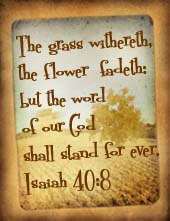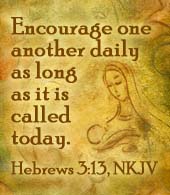 Because I'm a bit ridiculous when it comes to order, I'll tell you that after reading so much about Charlotte Mason, and more to the point, determining that things in our lives need to change and CM is a part of it, I naturally must begin with the beginning. And that is Bible.
Because I'm a bit ridiculous when it comes to order, I'll tell you that after reading so much about Charlotte Mason, and more to the point, determining that things in our lives need to change and CM is a part of it, I naturally must begin with the beginning. And that is Bible.
Bible lessons up till this year, have been our favorite. We've had three wonderful years with Biblical Principle Approach (BPA) and Judah Bible, however...this year I have found it lacking. Too much repetition for my ideal study. That makes me nuts because we've so enjoyed it and learned so much as the Holy Spirit has guided us through these lessons.
I will tell you, and many of you know this from hanging out here, the lessons are intricate, time consuming to prepare, and time consuming to deliver. Of course, there can't possibly be anything more worth while to spend our time on, so that doesn't so much matter. What does matter to me at this point is (and please excuse the analogy) that we don't keep Jesus on the Cross.
Scripture is God's whole story. Meaning "whole", as in "don't leave anything out". I've most assuredly been convinced that we don't want to miss a thing in God's Word. At the same time, I'm no genius and trying to figure out what to do has been a chore.
The Simply Charlotte Mason forums allowed me to get one answer that was broad, but covered the entire Bible in a six year rotation. (See below) It still didn't give me enough detail to know how to do it. Then there is a wonderful list that Penny Gardner made for OT and NT. This list is very useful as the scriptures are broken down into segments perfect for short lessons.
The biggest difference to me, method wise, and apart from the "short lesson" idea, is that Bible is studied concurrently with History and Geography. While that sounds great, we already have four years invested in a chronological history beginning with the Explorers and American History (I do not agree with teaching small children ancient history before teaching them a foundation of Biblical truths and principles. This article explains this to my liking.)
Here is the six-year rotation from Sonya at SCM:
1. Genesis-Deuteronomy
2. Joshua-Malachi
3. Matthew-Acts
4. Selected epistles
5. Selected epistles
6. Rest of epistles & Revelation
Then for older children, more focused studies:
1. Mosaic Law
2. Proverbs
3. Romans
4. Various Bible Study methods
5. Doctrine study
6. Doctrine study
I like this and find that we would be around year 3-4, and not ready for the older set in-depth, though we've covered some of it.
A few thoughts on what I want to do each week:
1. Read God's Word together! (15-20 minutes/day)
2. Begin Bible Drills with son (finding passages in scripture) once or twice a week. (5-10 min./wk)
3. Continue practicing the memorizing of the books of the Bible. (A couple of minutes at a time.)
4. Include Biblical Principle examination. (5-10 min./day where applicable)
5. Include Character trait focus. (5-10 min./day where applicable)
6. Continue hiding God's Word in our hearts with memory boxes. (10 minutes/a day--during a separate set-aside time)
It's funny to see what appears to be so little time set aside for things that are so vital, yet that's really all it takes to introduce an idea that remains with a child the rest of the day, week...his life. We don't stop talking about a lesson when the lesson is done! This is the part that this super-planning Mama forgets and begins to force scheduled time to the point of bitterness.
It occurs to me, as I think this through, that the problem with using anything but just the Bible for Bible lessons is that anything less than the whole involves an agenda. Whether it's Judah Bible, that I've used, which pounds home seven very important principles over and over, or a purchased workbook/focus study. That makes the CM philosophy of reading the whole Bible and the Bible alone (for Bible) very appropriate, encouraging and appealing.
Using the NT list, we'll get through the gospels by spring. I used excel to list out the lessons by approximate date. It's also a nice "coincidence" that we started it this week with the nativity stories. Works for me! I also took our "Child's Story Bible" (which we love for historical content, relevance and connectivity to the rest of scripture) and cross-referenced the index with the scripture passages.
One last thing I'll mention is "Discovering Doctrine" from SCM. It is an ebook for notebooking Bible according to ten doctrines that every scripture applies to at least one: Bible, God, Jesus, Holy Spirit, Man, Sin, Salvation, Angels, Church, Future Events. This, like Biblical Principles, is a great way to facilitate discussion of Biblical truths.
There you have it: Bible via Charlotte Mason. At least for this CM beginner!
Wednesday, December 10, 2008
Deciding Bible
Labels: Bible study, Charlotte Mason, lesson planning
Subscribe to:
Post Comments (Atom)





























2 comments:
"anything less than the whole involves an agenda..." I think this is the main reason I never embraced the Judah Bible and principle approach. It's the synthesis of the whole that is not ideal to me. I'd probably even shy away from that list of 10 Doctrines. I'd much rather open up God's Word and allow the Holy Spirit to guide our study. Using the Observation (with the 5Ws and and H questions), Interpretation, and Application method of inductive study is what really works for me.
I love reading how you wrestle through everything!
P.S. I finally purchased the Child's Story Bible (Vos) for Evangeline for Christmas...per your enthusiastic recommendation. I'm looking forward to incorporating it into our Bible study!
Post a Comment